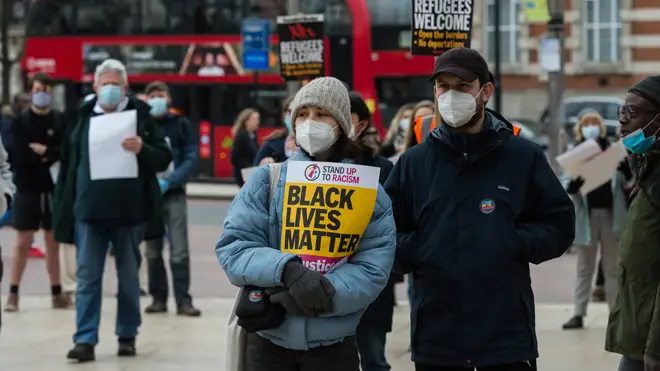
Matthew Wright 7am - 10am
31 March 2021, 11:54 | Updated: 31 March 2021, 14:12

Racism is 'diminishing', says co-author of UK race report
Britain is a model to other countries for diversity because of successes in areas like education, and a shrinking ethnicity pay gap, a landmark report has found.
The the 264-page report by the Commission on Race and Ethnic disparities found overt racism persists in the country, particularly online, and more work still needs to be done.
Selected highlights of the report were released overnight by the Government Equalities Office this morning and the full report was released later.
In the foreword of the full report, chair Dr Tony Sewell CBE said Britain is no longer a place "where the system is deliberately rigged against ethnic minorities."
"The impediments and disparities do exist, they are varied, and ironically very few of them are directly to do with racism," he writes.
"Too often ‘racism’ is the catch-all explanation, and can be simply implicitly accepted rather than explicitly examined."
The foreword goes on to say the authors "do not deny" that racism is a "real force" in the UK.
The full report makes 24 recommendations among other findings calling for key goals of building trust, promoting fairness, and achieving inclusivity for ethnic minorities to be achieved.
Among other findings, the report suggests:
The release of the report and its findings have sparked a significant backlash with Dr Halima Begum, chief executive of the Runnymede Trust, saying it was "deeply, deeply worrying" that the commission has denied the existence of institutional racism, while Independent MP Claudia Webbe tweeted that the finding was a "slap in the face".
Labour leader Sir Keir Starmer said he was "disappointed" by the findings from the report published so far. "I've seen the briefings out of it and I'm disappointed," he said.
"On the one hand, there's an acknowledgement of the problems, the issues, the challenges that face many black and minority ethnic communities.
"But, on the other hand, there's a reluctance to accept that that's structural."
The report, commissioned in the wake of last year's Black Lives Matter protests, said there have been improvements such as increasing diversity in elite professions and a shrinking ethnicity pay gap, although disparities remain.
READ MORE: Protester scales crane and unfurls BLM banner in London

Lisa Nandy 'deeply disappointed' by race report
It also found that children from many ethnic communities do as well or better than white pupils in compulsory education, with black Caribbean pupils the only group to perform less well.

And it said the pay gap between all ethnic minorities and the white majority population has shrunk to 2.3%, and is not significant for employees under 30.
The commission said education is "the single most emphatic success story of the British ethnic minority experience" and the most important tool to reduce racial disparities.
READ MORE: David Lammy schools caller who tells him he's "not English"

David Lammy schools caller who tells him he's "not English"
Success in education and, to a lesser extent, the economy "should be regarded as a model for other white-majority countries", it added.
It also said that issues around race and racism are becoming "less important", and in some cases are not a significant factor in explaining inequalities.
Different outcomes are complex and involve social class and family structure along with race, it said.

The report states: "We found that most of the disparities we examined, which some attribute to racial discrimination, often do not have their origins in racism."
However, it notes that some communities continue to be "haunted" by historic racism, which is creating "deep mistrust" and could be a barrier to success.
The 264-page report makes 24 recommendations, including for extended school days to be phased in, starting with disadvantaged areas, to help pupils catch up on missed learning during the pandemic.
Children from disadvantaged backgrounds should also have access to better quality careers advice in schools, funded by university outreach programmes.
And it is calling for more research to examine the drivers in communities where pupils perform well, so these can be replicated to help all children succeed.
The Commission also recommends that the acronym BAME (Black, Asian and Minority Ethnic) should no longer be used as differences between groups are as important as what they have in common.
And it calls for organisations to stop funding unconscious bias training and for the Government and experts to develop resources to help advance workplace equality.
Commission chairman Tony Sewell said: "The report highlights the significance of education as the single most powerful tool in reducing ethnic disparities. The effect of education is transformative on individuals but also their families and their communities, sometimes within a generation.
"Another revelation from our dive into the data was just how stuck some groups from the white majority are.
"As a result, we came to the view that recommendations should, wherever possible, be designed to remove obstacles for everyone, rather than specific groups."
Dr Sewell added: "Creating a successful multi-ethnic society is hard, and racial disparities exist wherever such a society is being forged. The Commission believes that if these recommendations are implemented, it will give a further burst of momentum to the story of our country's progress to a successful multi-ethnic and multicultural community - a beacon to the rest of Europe and the world."